This post is also available in:
The online gambling sector in Brazil is under a magnifying glass. Growing concerns about its integrity are almost physiological in a young market and persistent rumors that games can be manipulated reflect public skepticism about the industry’s fairness.
In light of this, our study explores original survey data that reveals the perception of fairness that 617 Brazilian adult respondents have about gambling.
The survey questions outline a demographic profile – location, age, gender, and relative gaming experience – but focus on the players’ awareness and beliefs about fairness control mechanisms. We also explore the public opinion about the Brazilian institutional capacity to impact and improve the integrity of real-money games.
The findings of this report are contextualized within the ongoing debate on gambling regulation in Brazil. They identify the current sentiment of Brazilians and provide industry stakeholders with actionable insights into the Brazilian gambling market. Such an approach paves the way for an informed discussion on future regulatory improvements.
Are Online Gambling Platforms “Unfair” in Brazil?
Part of analyzing the Brazilian gambling market is understanding how its players perceive it. The safety of players has always been a concern (of reputable operators) in the industry, prompting a discussion on the integrity of gambling in general.
In this scenario, issues concerning health and addiction have been constantly highlighted by researchers, regulators, and the media. They all seek common ground with operators on how to ensure the fairness and sustainability of the market. Since the legalization of real-money games in Brazil, the debate has been more heated than ever.
When asked about how fair casino games and sports betting are, 35% of our respondents replied ‘very unfair’ or ‘unfair’, whereas only 19% stated ‘very fair’ or ‘fair’.
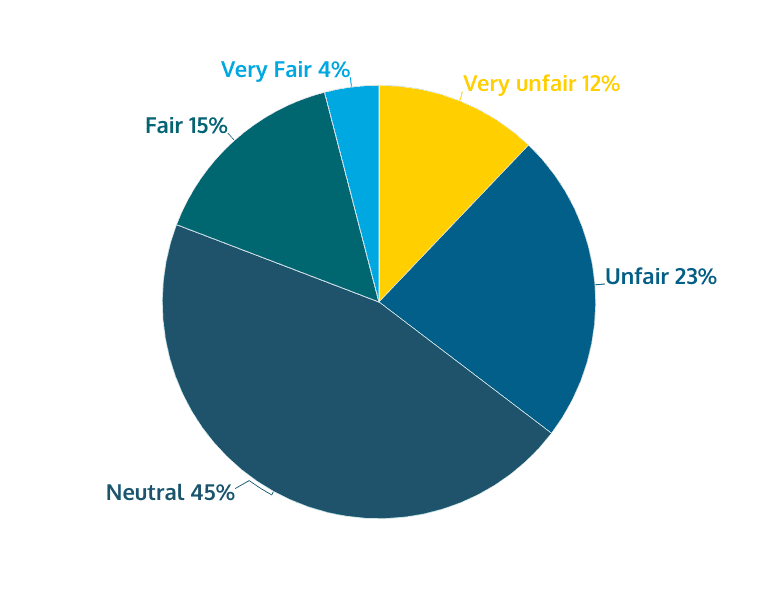
Interestingly, 45% assumed a neutral position when it comes to the fairness of online gambling in general. This reflects the gap of knowledge among Brazilians on what safe and fair gambling is; dealing with this unfamiliarity can be a more complex scenario because it requires consistent efforts in education and awareness.
Curiously (and unfortunately), the public opinion of Brazilians is based on the idea that most operators are interested in perpetuating scams and fraud. This, among other factors, contributes ultimately to their perception of gambling as mostly unfair.
A prime example of this stance is the answer to the question of whether ‘casino and sports betting platforms pay out winnings correctly’. There were mixed feelings among the respondents, to say the least.
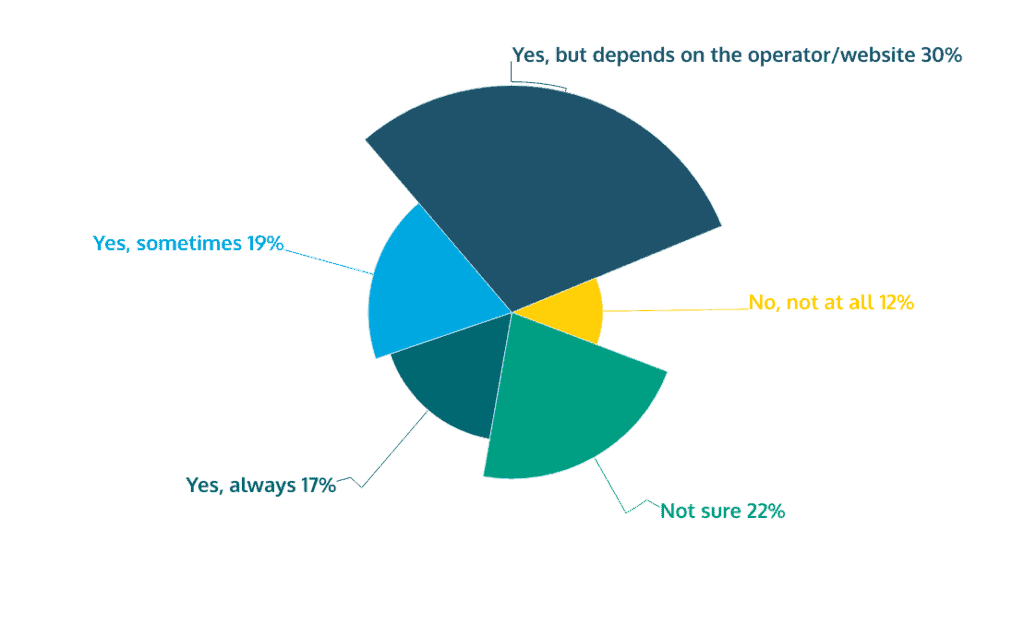
30% answered ‘it depends on the operator/website’, while 17% answered ‘always’, and 19% ‘sometimes’.
On the other hand, 22% said they were ‘not sure’, while 12% stated the correct payment ‘never happens’.
This shows that many illegal platforms are still competing with licensed ones – which inevitably affects the players’ sentiment towards the trustworthiness of casinos in general – as we will see in more detail next.
How Are Casinos Games Controlled for Fairness?
To address every aspect of the gamers’ point of view, we asked them if they knew how casino games’ fairness is controlled.
An overwhelming 74% didn’t know how to respond, while 11% claimed that ‘they are tested’ and 15% said ‘they are tested and monitored’. The lack of knowledge on how such testing and monitoring is conducted is clear and emphatic, as revealed further in the next responses.
Can Casino Games Be Manipulated?
The two following questions might be the most intriguing part of this survey. First, we asked respondents if they ‘believe it’s possible to manipulate the game in their favor by following strategies published online’.
As we can see below, the conviction that casinos can be manipulated somehow in the players’ favor prevails.
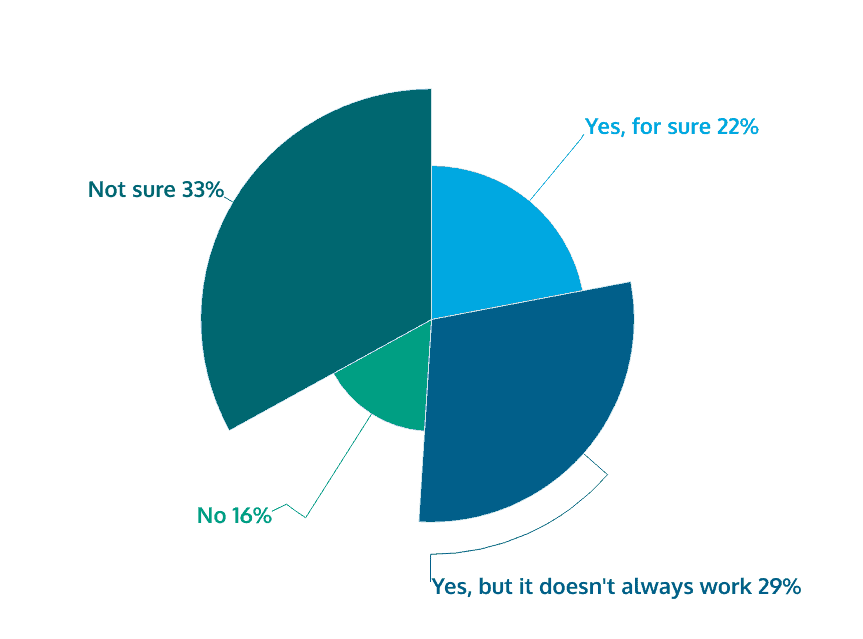
A combined 51% believe that they can manipulate the results of a casino game in their favor by following certain strategies – even if it doesn’t always work. Furthermore, 33% are not sure if this is possible or not. Only 16% agree that cheating the house is impossible.
Again, this raises a concern about misinformation on gambling, which can jeopardize the players’ well-being and, in certain cases lead to problem gaming
This brings us to the question if they ‘think games can be manipulated by the casino’.
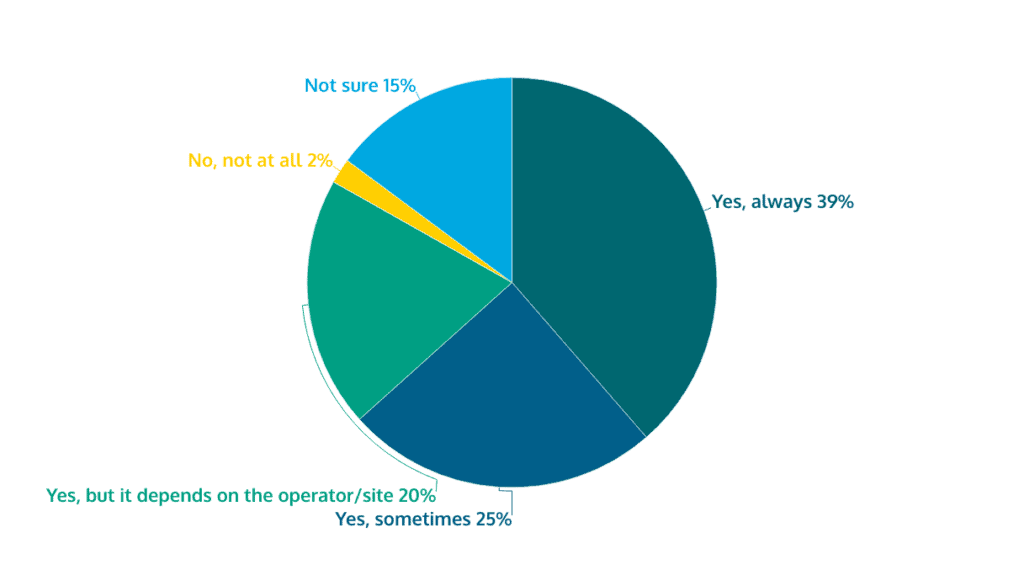
Similar to the previous results, the majority think that operators can manipulate games; 39% believe this happens always, while 25% state this only happens sometimes.
It is also interesting how 20% claim manipulation depends on the operator. Indeed, casino websites have been accused of operating illegally or even proven to not pay out winnings in the past.
The Key Message – Casino Game Outcomes Are Random!
In this scenario, it is important to highlight how real money games are certified for fairness.
Game providers use a combination of complex algorithms, like Random Number Generators (RNG) or a “Provably Fair” game technology based on random hash codes.
RNG is the foundation of online gambling because it helps providers and operators implement provable transparency in the game outcomes. These random results are meticulously tested and certified by laboratories approved by Government regulators, according to official standards. The process validates and verifies the trustworthiness of online gambling platforms and – when passed – should leave no doubt in players.
Simply put, the RNG is a way to ensure nothing affects the games’ results, but luck. In this way, the game outcomes are unpredictable and therefore equally fair to all participants, making them not liable to manipulation.
Evidently, most Brazilian players are not familiar with this concept and don’t really know if and how casinos guarantee game fairness. It is not mainstream knowledge how online casinos get their operational licenses or how they comply with financial safety, data security, or legal standards This information gap naturally contributes to their skepticism about real-money game fairness.
Social Media Influence on Casino Gamers – The “Proven” Manipulation Strategies
We asked our respondents ‘where they get reliable information on casino games’, and their answers showed us the predominance of social media as the main source of information.
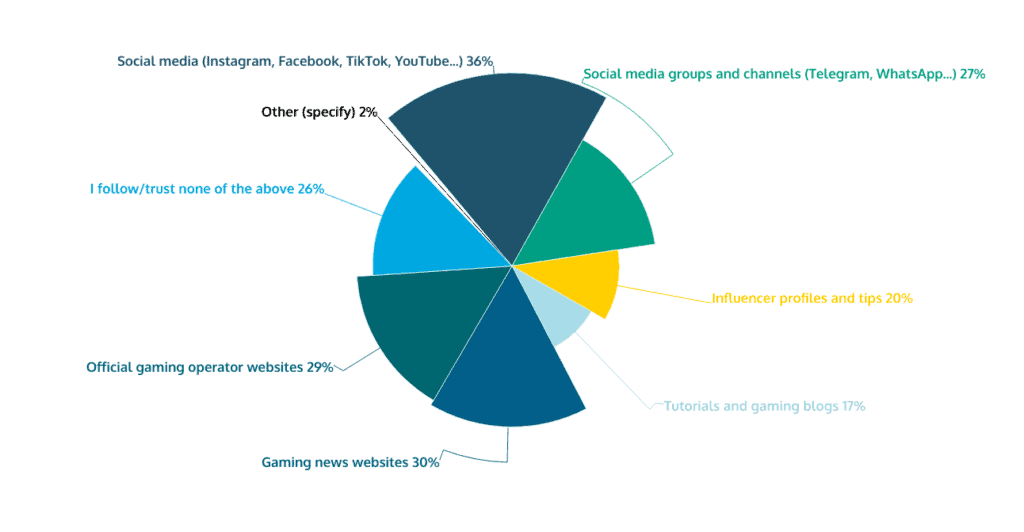
As we can see, 63% of the respondents use some type of social media to get the information they consider reliable about online betting and casino games – with yet another 20% going to influencer profiles for tips.
Compared to these figures, the gaming news websites (30%) and official gaming operator websites (29%) hold less sway among Brazilians.
Among the ‘other ways‘ (2%) the players mentioned as sources of trustworthy information about casinos, the most common are ‘family’, ‘friends’, ‘reliable people close to me’, and ‘online research’.

The most interesting variable in questioning the integrity of casino games is the “proven manipulation methods” – usually spread in social media.
Given the popularity of social networks, it almost comes as no surprise that scammy groups and influencers that promote fraudulent websites and “ways to manipulate the results” have arisen. They have become the main sources of this type of misinformation, contributing to a dangerous phenomenon that has jeopardized player safety and responsible gambling efforts.
That is why we asked our surveyees ‘which manipulation methods they had heard of’.
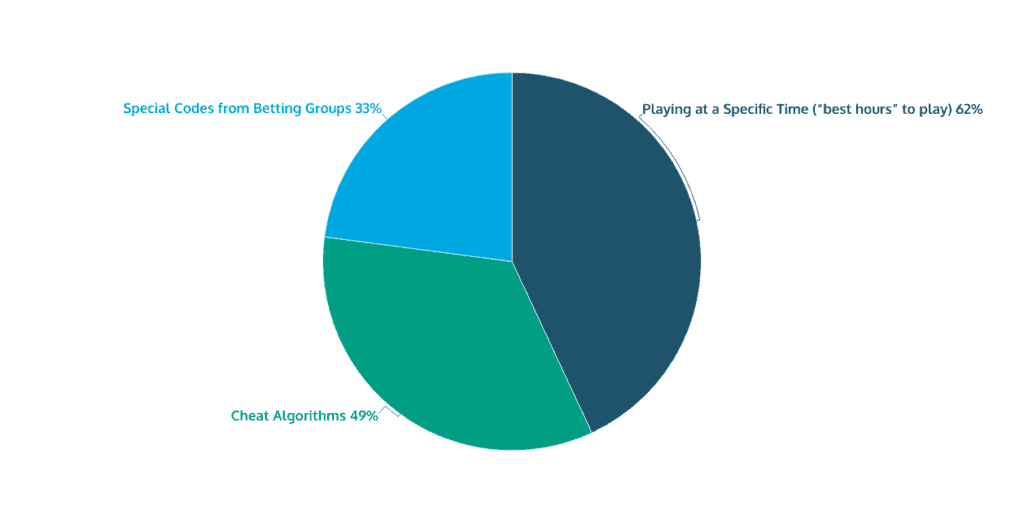
The fact that 62% have heard that playing at a specific time is a strategy to manipulate the outcomes of the games is plain astonishing.
Cheat algorithms (49%) and special codes (33%) are also well-known, confirming the concerns about the industry being perceived as susceptible to manipulation and, therefore, unfair.
This also reveals that Brazilians think they know more about manipulation strategies than about how casino games actually work, get tested, and are monitored.
That is why we also asked if they think influencers alert people enough to gamble responsibly, and the answer was clear:
47% think the majority of them don’t alert people, while 32% stated that some do, and some don’t. At the tail end, few are convinced they do alert people (11%), while some are not sure (10%).
Ultimately, this shows how the spreading of misinformation makes players more susceptible to falling victim to online scams, contributing to an unrealistic perception of gambling fairness.
The Public Sentiment on Gambling Integrity and Safety
To widen our understanding of these players’ sentiments, we asked them ‘how comfortable they are playing casino games and/or sports betting online’.
The results revealed that the Brazilians have mixed feelings about it, with a slight tendency towards being uncomfortable.
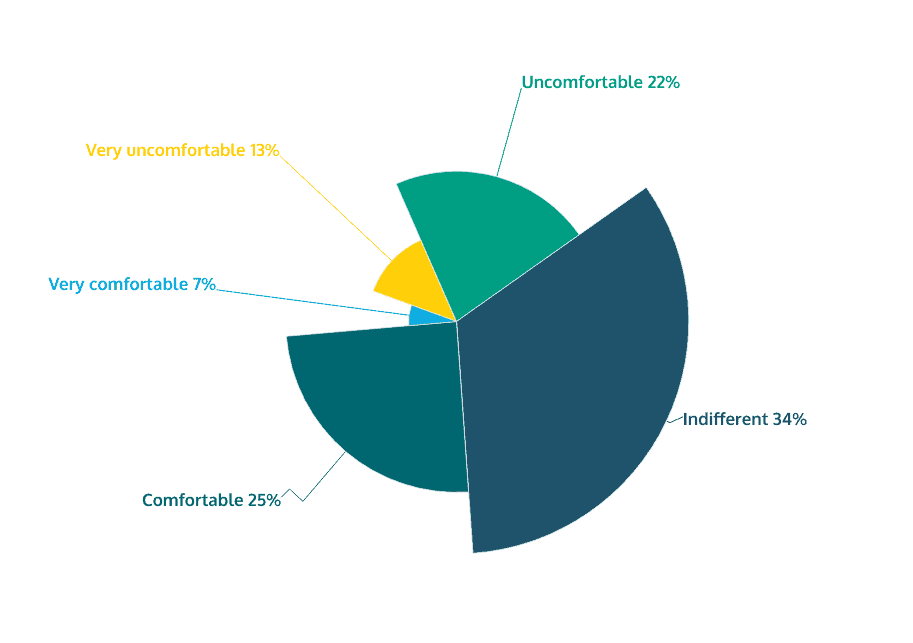
A combined 35% of the respondents claimed to be ‘very uncomfortable’ or ‘uncomfortable’ with it, while 32% (combined) claimed to be ‘very comfortable’ or ‘comfortable’ with online gambling. On the other hand, 34% stated that they are indifferent to it.
This indicates low familiarity of respondents with gambling trustworthiness in general, as well as possibly a knowledge gap on the legal status or safety of online gambling. These can easily lead to a passive or uncertain stance.
As discussed earlier, poor access to reliable information makes players vulnerable to gambling scams. Media reports or even rumors about those contribute in turn to their skepticism about the fairness of gambling in general.
When asked if they had ever fallen victim to a scam involving online games, 52% stated they had never been in that position.
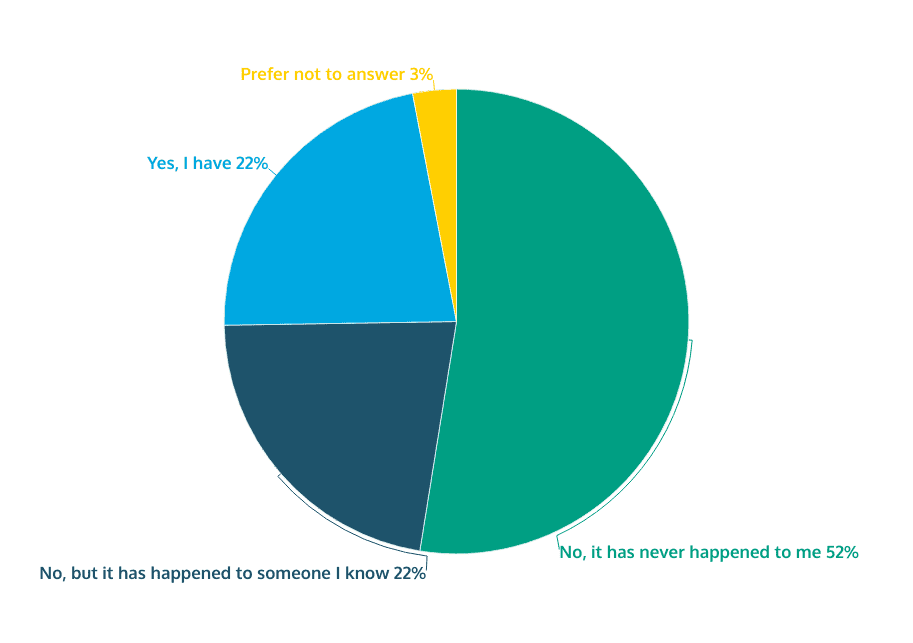
However, 22% have been a victim of a gaming scam, while another 22% know someone who has been a victim of a scam or unrealistic promises of significant profits.
The combined 44% share is not positive news for the industry’s reputation, regardless of any actual proof behind these claims. Associating gaming with fraud negatively affects the general perception of the sector’s trustworthiness and integrity.
Player Views on Game Fairness
To complete the picture, we asked respondents ‘which games they found the fairest, based on their experience’.
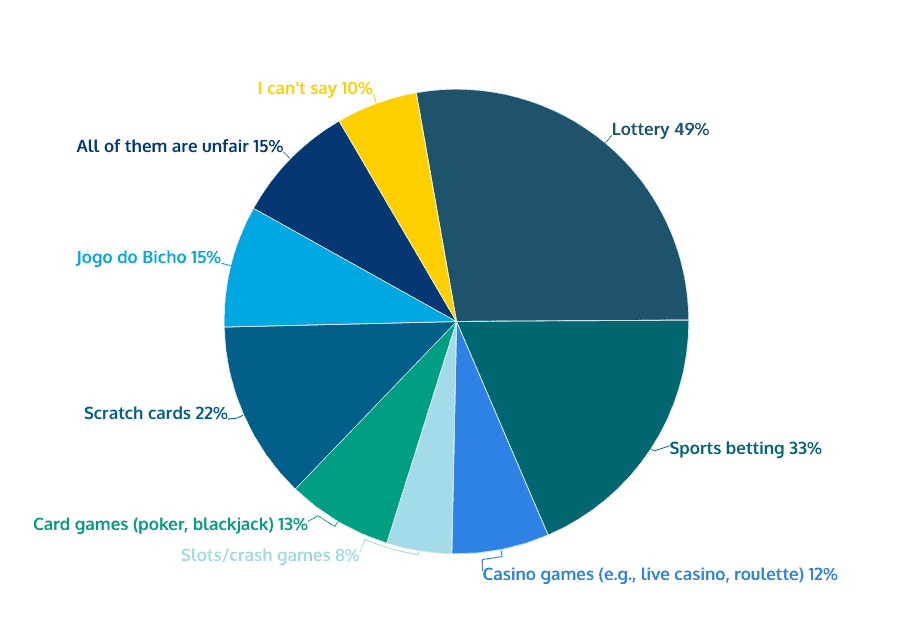
Not surprisingly, the lottery is considered the fairest by 49% of the interviewees, followed by sports betting at 33%.
These are also the most popular verticals in Brazil (according to our survey, 72% claimed they bet on lottery and 42%, on sports betting). They are historically the most well-known, with the lottery also considered “traditional” and therefore already accepted. Both are already part of Brazilian betting culture – and the lottery is even a government initiative – which contributes to them being perceived as fairest.
Although casino games are somewhat less popular among Brazilians, the boom of slots, crash games, and live casino tables has quickly put them on the gaming map.
We see that some respondents used the ‘others’ section to highlight specific game titles – like Aviator and Fortune Tiger (this one appeared several times as ‘jogo do tigrinho’).
However, as mentioned before, online casino games have been perceived as generally more risky by the public – which reveals the challenges for this vertical that industry stakeholders need to address.
Gambling Transparency – Who Is Responsible and How to Improve Game Fairness?
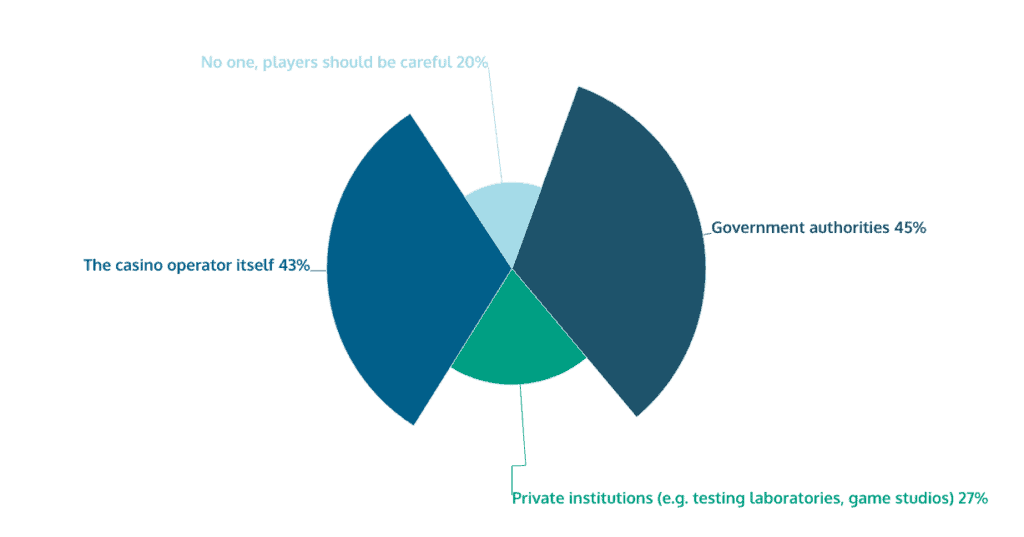
When inquired about whose responsibility it is to make casino games fair, we had a balanced split between Government authorities (45%) and casino operators (43%).
Related private stakeholders (27% for the likes of testing labs and game studios) are also deemed responsible for ensuring games are fair and trustworthy.
On the other hand, it is interesting to note that 20% still think players should be the only ones accountable for their own safety and protection while gambling.
This mentality is also reflected in their answers to ‘what actions they believe can improve their perception of fairness in casino games’.
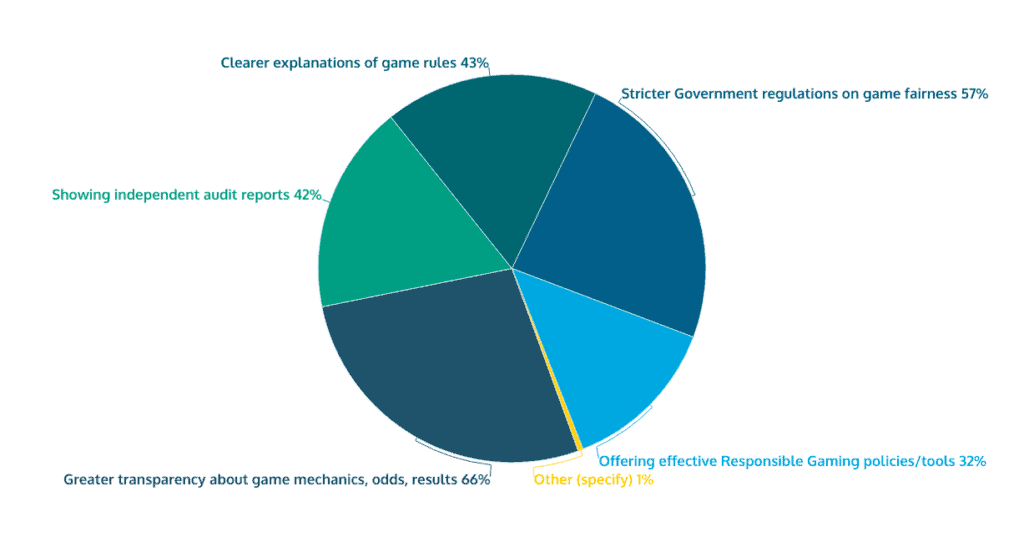
66% consider that the main action to improve their perception of fairness should be more transparency on game mechanics, odds, and results.
Again, this stresses the knowledge gap among Brazilians about the very nature of real-money games and the need for reliable information that will make the industry be perceived as trustworthy.
Over half of respondents (57%) point to the need for stricter regulations by the government, followed by a clearer explanation of game rules (43%), independent audit reports (42%), and effective Responsible Gaming policies (32%). This priority list confirms our previous conclusions about the gambling regulation that Brazilians, in general, are in favor of a clear and possibly stricter regulatory framework for iGaming.
Some interesting points came up in the ‘other’ (1%) measures players see as conducive, such as ‘open code’, ‘bonus/promotions’, and ‘combatting money laundering and results manipulation’.
All of the above indicate a belief that there is a wide range of tech-based and legislative options on the table. Players are genuinely interested in seeing advancements in the sector that can improve their gaming experience, especially if they ensure a sense of protection and fairness.
Key Qualities of Trusted Online Gaming Platforms
We asked the surveyees ‘what is most important to them in an online gaming platform’, and 62% stated it is the security of their personal and payment data.
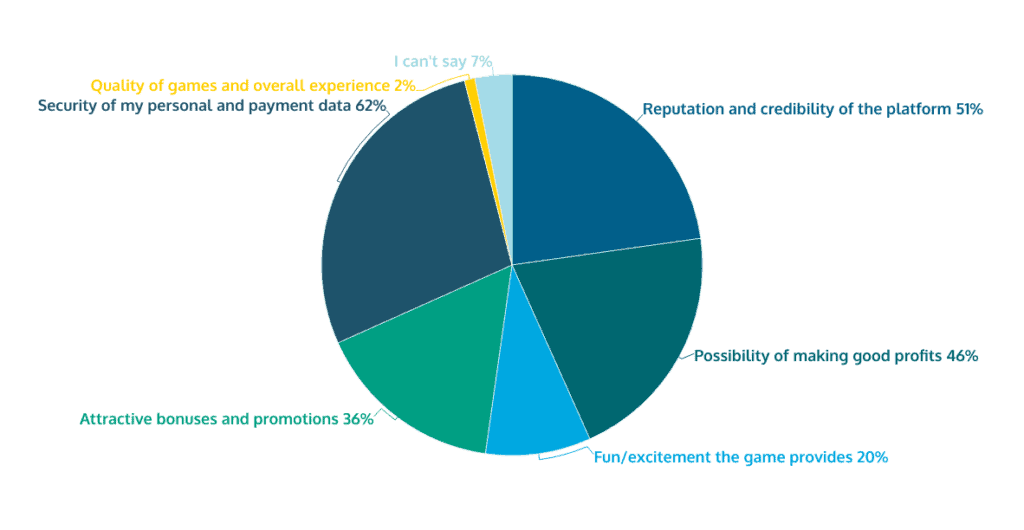
Reputation and credibility of the platform were considered important by 51% of the players, even if that is a very subjective metric, as we have seen so far. Only behind these two, we see the importance of (possibly) making good profits (46%), attractive bonuses and promotions (36%), and fun/excitement (20%).
Payment security was also mentioned a few times in the open-question section, along with ‘best bonuses’, and ‘good gameplay’ – highlighting the value of user-friendly UX and the sense of security Brazilian gamers perceive.
Brief Profile Overview
The profile of survey respondents was very diverse. We had 52% female and 48% male. All were between 18 to 75 years old, with a dominant share of those between 25 to 40 years old (37%).
In terms of place of residence, the majority of respondents come from the Southeast (45%), with 43% living in state capitals. São Paulo was the most represented state (27%), followed by Rio de Janeiro and Minas Gerais, both with 9% of respondents.
Their educational background tells us that 49% have completed a university degree, while 45% have completed high school.
The above factors also impact the socioeconomic status of interviewees, with the majority being part of middle-class C (32%) and upper-middle-class B (25%).
These indicators enrich the socioeconomic context of the responses and, ultimately, offer enough evidence that the perceptions we analyzed form a solid pattern across all demographics and social groups.
Lessons on Perceived Fairness and the Challenges Ahead
Since the majority of Brazilian gamblers perceive the real-money gaming sector as not quite fair, the industry struggles to prove and uphold its integrity and trustworthiness.
The challenges come from several angles, as highlighted by our respondents:
- Improving transparency on how casino games are controlled and monitored – including gaming mechanics, rules, and odds;
- Ensuring effective implementation of a gambling regulation that prevents scams and fraud – including social media channels and advertising standards;
- Addressing the players’ knowledge gap about the industry in pragmatic ways;
- Providing more effective tools and initiatives for responsible gambling.
To enable this reputational shift, all stakeholders – regulators, operators, and consumer groups – must work together to build public confidence through transparency and enhanced player protection. Educating the public about concepts like RNG, game certificates, operator licenses, as well as legal safety nets can help lead the market toward maturity and improve consumer confidence.
Promoting responsible gambling practices and combatting misinformation are just as important steps toward reshaping the public perception of fairness in gambling.


